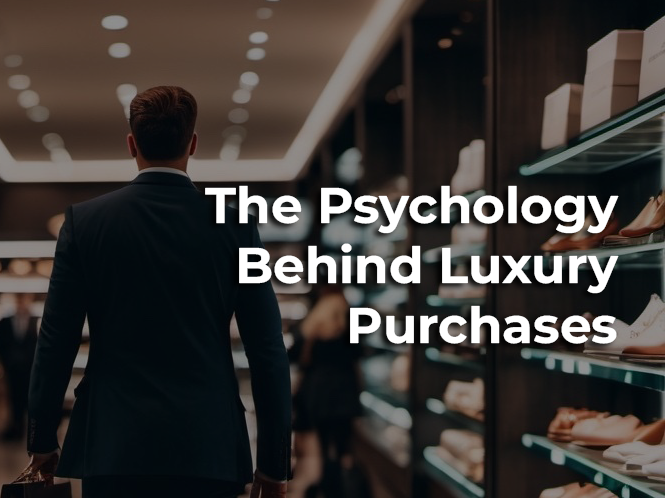The Introduction to How Cybernetics Enhance High-End Consumer Experiences
While the concept of cybernetics may not be widely recognized in mainstream discussions, it is already prevalent among luxury brands, whether they acknowledge it or not.
Shopping for Perfume
Luxury has long been synonymous with exclusivity, exceptional craftsmanship, and personalized service. Yet, as digital transformation continues to reshape entire industries, high-end brands are increasingly adopting AI-powered cybernetic systems—innovative technologies that adapt and respond to customer interactions. These systems represent a convergence of cutting-edge technology and adaptive intelligence, transforming not only how brands operate but also how they connect with their customers on a deeply personalized level.
At its core, cybernetics is the study of communication and control systems, focusing on how automated processes adjust and regulate based on feedback (cybernetics, n.d.). Derived from the Greek word kybernētēs, meaning "steersman" or "governor," the term embodies the concept of systems that govern and navigate information. Cybernetics seeks to understand how mechanisms self-regulate and adapt to change, creating a seamless flow of decision-making that enhances interactions between humans and machines. In the luxury market, this refined understanding of systems manifests in highly personalized, intuitive customer experiences. From AI-driven customer service that anticipates needs to smart technologies that refine in-store environments, cybernetics is reshaping how luxury brands engage with their clientele, creating a more tailored, intuitive, and exclusive atmosphere. By embracing these technological innovations, luxury brands are not merely adapting to the digital age—they’re setting new standards for what it means to offer a premium, forward-thinking experience.
One-of-a-Kind Bespoke Experiences
Personalization while shopping
According to McKinsey & Company, the potential impact of generative AI on the fashion, apparel, and luxury sectors is immense, with estimates suggesting it could add between $150 billion and $275 billion to operating profits over the next three to five years (Harreis, Koullias, Roberts, & Te, 2023). This transformative technology promises to revolutionize several aspects of luxury, including product development, customer experience, and operational efficiency.
AI’s ability to accelerate product design, improve marketing strategies, and enhance customer interaction provides luxury brands with the tools to stay ahead in a highly competitive market. Personalization has always been a pillar of luxury, and AI cybernetic systems are taking this to new heights. By analyzing customer data in real time, AI systems deliver hyper-personalized recommendations that make every interaction feel exclusive and finely tuned to individual preferences. This elevated level of customization fosters deeper customer loyalty and engagement with luxury brands.
For example, Antonio Carriero, former Chief Digital and Technology Officer at Breitling, discussed how the brand used unsupervised machine learning to analyze raw, unstructured data, uncovering unexpected customer patterns (Girod, 2024). This enabled Breitling to personalize communication more effectively and improve conversion rates by aligning messaging with customer interests, such as lifestyle-oriented content rather than focusing solely on product features. Carriero emphasized that AI-driven personalization aligns with the essence of luxury—innovation and new experiences. By leveraging machine learning, Breitling could create more engaging and personalized interactions, enhancing their connection with consumers and ensuring each communication felt deeply relevant.
Revolutionizing Experience
Brands like Dior and Nordstrom are integrating AI-powered Augmented Reality (AR) to offer personalized virtual try-ons, merging convenience with high-touch customer interaction (Sahota, 2024). Dior, for example, allows customers to try on accessories virtually, while Nordstrom’s AI-enhanced digital mirrors enable in-store shoppers to virtually try on clothing and accessories, providing tailored recommendations that complement their outfits. This fusion of AI and personalization elevates the in-store experience, offering a seamless, interactive shopping journey that adapts to each customer's preferences.
BMW has also embraced AI to deliver customized driving experiences and personalized product suggestions for their luxury automotive clientele (Luxonomy, 2025). The brand uses AI to optimize vehicle performance, enhance driver assistance features, and create tailored customer engagements based on data-driven insights (Jerome, 2025). These cybernetic integrations ensure a more intuitive, responsive ownership experience, meeting modern customer expectations for personalization and convenience.
Improving Customer Service and Engagement
Luxury brands can utilize cybernetic algorithms combined with predictive marketing to proactively anticipate customer needs and shopping preferences. Real-time feedback loops allow systems to refine recommendations, boosting customer satisfaction and fostering long-term loyalty. AI-powered concierge services can provide tailored suggestions, while automated reminders for significant dates help nurture customer relationships (Rank Secure, 2024).
Checking Wishlists
Burberry has taken AI integration a step further, blending sophisticated chatbots and interactive apps with cybernetic systems to deliver a highly personalized shopping journey (Sahota, 2024). The chatbots offer features like shopping the collection, behind-the-scenes access, push notifications for bot interactions, customer service inquiries, and live chat with a Burberry consultant, enhancing the customer experience in a seamless and intuitive way (Burberry Bot — ChatbotGuide.org, n.d.).
Similarly, Gucci’s AI-driven styling system uses advanced machine learning algorithms to forecast emerging fashion trends and create new collections based on consumer style preferences (Sahota, 2024). These systems evolve continuously, incorporating feedback from each customer interaction to ensure that designs align with ever-changing tastes. As a result, Gucci creates an experience that remains adaptive, maintaining a close connection with its clientele as their preferences shift.
Personalized Beauty Solutions
Estée Lauder is leading the way in personalized skincare by leveraging AI-powered tools to provide customized skincare advice (Luxonomy, 2025). By analyzing a customer’s skin type, concerns, and needs, these systems suggest products most likely to achieve the desired results. The ability to update recommendations in real time, based on feedback, ensures a highly personalized beauty journey (Writer, 2020). Estée Lauder’s commitment to AI-driven personalization sets the brand apart as a leader in bespoke skincare solutions, offering customers an experience that feels uniquely tailored to their individual needs.
The Rise of a Decentralized Approach to Real-Time Personalization
As AI continues to evolve, systems are increasingly able to analyze vast amounts of data and make informed decisions. Traditionally, AI relies on centralized servers and clouds to process and store this data remotely, introducing potential delays as information is transmitted across the internet (Von Eden, 2021). While effective, this model can raise privacy concerns as sensitive data is often stored on external servers, increasing the risk of data breaches.
In response, Edge AI has emerged as an innovative solution, processing data directly on the customer's device—whether it’s a smartphone, wearable, or other connected device (Von Eden, 2021). This decentralized approach enables real-time personalization, allowing systems to adjust to customer preferences without the need for cloud-based processing. In luxury markets, Edge AI embodies the principles of cybernetics, creating adaptive feedback loops that refine customer experiences dynamically. By processing data locally, Edge AI not only enhances efficiency and reduces latency but also bolsters privacy, minimizing the risk of data misuse.
The decentralized nature of Edge AI empowers luxury brands to offer autonomous, personalized experiences. For instance, brands can instantly adjust product recommendations, customer support responses, or marketing messages based on real-time interactions. This ability to tailor the customer journey ensures an intuitive and seamless experience, elevating personalization in a way that aligns with the evolving expectations of modern luxury consumers.
The Future of Luxury and Cybernetics
The fusion of luxury and cybernetics marks a transformative shift in how high-end brands connect with their customers. By integrating AI-powered systems, luxury brands are not just enhancing their products and services—they are redefining what it means to offer a truly personalized experience. From bespoke product recommendations to intuitive in-store interactions, these systems create a seamless and tailored journey that caters to the individual needs and preferences of each customer.
As we look to the future, the continued adoption of cybernetic technologies, including AI and Edge AI, will only deepen the level of personalization and efficiency in luxury experiences. This will not only drive customer loyalty but also set new standards for exclusivity and sophistication in the luxury market. By leveraging these innovative tools, brands like Burberry, Gucci, and Estée Lauder are proving that the future of luxury is rooted in dynamic, data-driven personalization that aligns with the desires of the modern consumer.
In this new era, luxury is evolving to embrace a harmonious blend of craftsmanship and intelligent systems, creating experiences that respond to customers' unique preferences with unprecedented precision. The integration of cybernetic systems is not merely a trend but the foundation of a new luxury standard, one that is personalized, intuitive, and dynamically responsive to the ever-changing needs of discerning clients.
References
Burberry Bot — ChatbotGuide.org. (n.d.). ChatbotGuide.org. https://www.chatbotguide.org/burberry-bot/
cybernetics. (n.d.). In Merriam-Webster Dictionary. https://www.merriam-webster.com/dictionary/cybernetics
Girod, S. J. (2024, May 24). How luxury brands bet on generative AI to solve old and new challenges. Forbes. https://www.forbes.com/sites/stephanegirod/2024/05/24/how-luxury-brands-bet-on-generative-ai-to-solve-old-and-new-challenges/
Harreis, H., Koullias, T., Roberts, R., & Te, K. (2023, March 8). Generative AI: Unlocking the future of fashion. McKinsey & Company. https://www.mckinsey.com/industries/retail/our-insights/generative-ai-unlocking-the-future-of-fashion
Jerome, T. (2025, January 8). How BMW’s AI Enhances Your Journey in 2025. Competition B. https://www.competitionbmw.com/how-bmws-ai-enhances-your-journey-in-2025/
Luxonomy. (2025, February 7). The impact of AI-Powered personalization in luxury brands. LUXONOMY. https://luxonomy.net/the-impact-of-ai-powered-personalization-in-luxury-brands/
Sahota, N. (2024b, March 15). Weaving elegance with intelligence: How luxury brands are embracing AI. Forbes. https://www.forbes.com/sites/neilsahota/2024/03/15/weaving-elegance-with-intelligence-how-luxury-brands-are-embracing-ai/
Rank Secure. (2024, November 15). Using AI and predictive marketing to impress luxury clients. Rank Secure | Search Engine Optimization & Web Design Toronto Firm. https://www.ranksecure.ca/how-to-use-ai-and-predictive-marketing-to-impress-luxury-clients/
Von Eden, H. (2021, April 7). Edge AI as the future of personalized luxury - Luxury Institute. Haus Von Eden. https://www.hausvoneden.com/technology/edge-ai-as-the-future-of-personalized-luxury-luxury-institute/
Writer, S. (2020, June 10). Meet ‘Liv’: Estée Lauder launches WhatsApp skincare chatbot - Marketing Gazette. Marketing Gazette. https://marketinggazette.co.uk/2020/06/10/meet-liv-estee-lauder-launches-whatsapp-skincare-chatbot/


